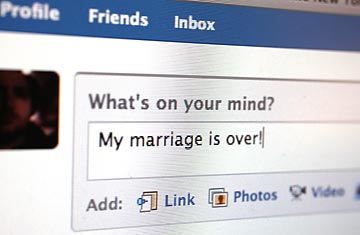
Not long after Patrick told his wife Tammie he wanted a divorce, she posted an angry, hurt note on "the wall," or public-comments section, of his Facebook page. Embarrassed that his colleagues, clients, church friends and family could see evidence of his marital woes, he deleted it and blocked his wife from seeing his page. A couple of days later, the IT worker in Florida--who asked that his last name not be used in this story — found alarmed messages from two Facebook friends in his inbox. Tammie had used a mutual friend's account to view Patrick's wall and e-mailed several women he had had exchanges with. He says her e-mails were borderline defamatory. She says they merely noted that he was married with children, a fact he had left off his Facebook profile. Either way: Ouch.
For those who want to connect or reconnect with others, social-networking sites are a huge, glorious honeypot. But for those who are disconnecting, they can make things quite sticky. And as the age of online-social-network users creeps up, it overlaps more with the age of divorce-lawyer users, resulting in the kind of semipublic laundry-airing that can turn aggrieved spouses into enraged ones and friends into embarrassed spectators.
Lawyers, however, love these sites, which can be evidentiary gold mines. Did your husband's new girlfriend Twitter about getting a piece of jewelry? The court might regard that as marital assets being disbursed to a third party. Did your wife tell the court she's incapable of getting a job? Then your lawyer should ask why she's pursuing job interviews through LinkedIn.
Battles over finances and custody remain the Iwo Jima and Stalingrad of divorce cases. Opposing lawyers will press any advantage they have, and personal information on sites like Facebook, MySpace and LinkedIn is like decoded bulletins from enemy territory. "It's now just routine for us to go over with clients whether they have an active presence on the Web and if they Twitter or have a MySpace page," says Joseph Cordell of Cordell & Cordell, a domestic-relations law firm with offices in 10 states. He advises his mostly male clients to scour their page — and their girlfriend's — for anything that could be used by their ex's legal team. Then Cordell studies the page of the soon-to-be ex-wife.
"We had a custody case where a mom assured the court that she hadn't been drinking," recalls the Missouri-based attorney. "But her MySpace page had actual dated photos of her drinking — and smoking, which is also of interest." In another case, a mom had listed herself on a dating site as single with no kids, which Cordell's firm used to cast doubt on her truthfulness.
And that's just the courtroom stuff.
Half the fun of social-networking sites is the posting of personal news. The other half is the posting of personal opinion, something spurned spouses typically have in spades. MySpace and its ilk offer the giddying cocktail of being able to say something in the privacy of your home that will be publicly accessible, along with a chaser of instant gratification. All this at a time when people are often less than their best selves. On the walls of two Facebook groups — I Hate My Ex-Husband and I Hate My Ex-Wife, which together had been joined by 236 Facebook users as of early June — posts include all manner of (often misspelled) vitriol, including some colorful British slang: "my husband is ... a dirty smelly chavvy theivin alcoholic drug addict selfish scum bag" and "my ex wife is a no good lieing slag," each of which was posted alongside a smiling photograph of the commenter.
There's little the besmirched can do legally, unless there are children involved. Family-law courts routinely issue restraining orders to prevent one parent from disparaging another to a child. "The question is, If it's on the Internet, can that speech be blocked?" says Stephen Mindel, a managing partner at Feinberg, Mindel, Brandt & Klein in Los Angeles. "The First Amendment is going to come into conflict with the family-law courts."
Issuing an order to remove children's access to Facebook is pointless, says Chicago-based lawyer Jennifer Smetters. "The kids just go on a fishing expedition to find out what's so secret. And no child needs to see their parent being publicly humiliated." Smetters has seen cases where messages on a social-networking site were part of a harassment campaign that led to the court's issuing a civil order of protection.
It seems everybody — except perhaps some lawyers — would be better off if divorcing spouses gave each other some space on MySpace. But when confused, anguished people look for ways to work through their feelings, a social-networking site can be an almost irresistible venue.
Patrick and Tammie are still active on Facebook. So are decoupled East Coast residents Andrea and Adrian, even after "he told me he didn't have any money and then posted pictures of his new BMW bike," Andrea says. He says Facebook helped her stalk him. "It's had a very negative impact on our communication," he adds.
But there can be some positives. Tammie's friends post supportive messages on her Facebook page. And Patrick says he understands online social networks better now. "It's like putting everybody you know in the same room. I'm using it, but I'm much more careful."
